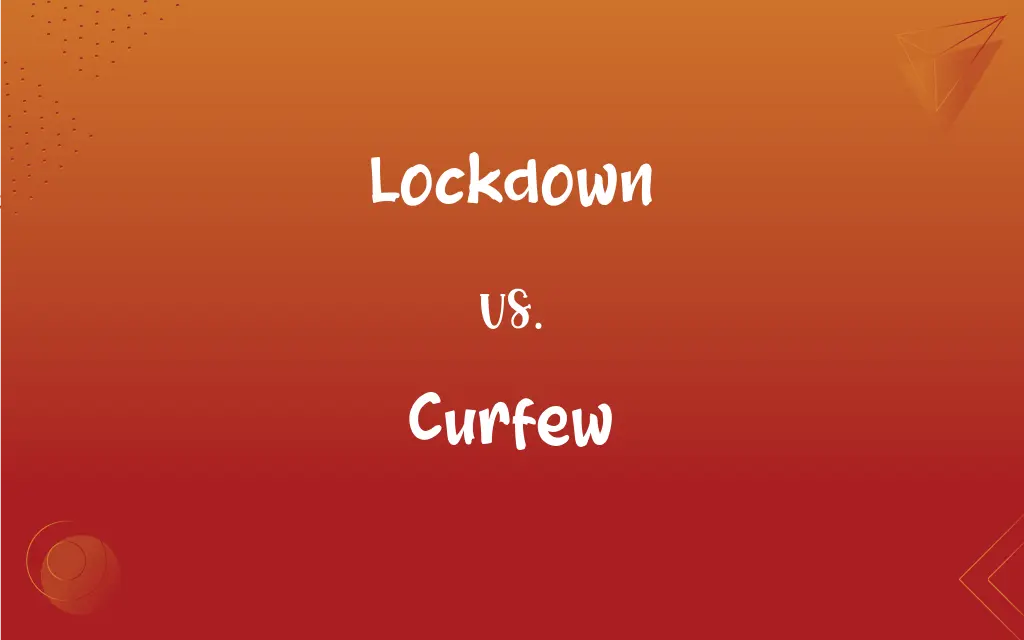Lockdown vs. Curfew: What's the Difference?
Edited by Aimie Carlson || By Janet White || Published on March 27, 2024
Lockdown is a restriction policy for people or community to stay where they are, often due to a crisis like a pandemic, while a curfew restricts public activities during specified times, usually to maintain order.

Key Differences
Lockdown typically involves comprehensive restrictions on movement and activities, often implemented during emergencies like pandemics or natural disasters. It usually means closing non-essential services and limiting people's ability to leave their homes. Curfew, on the other hand, is a regulation requiring people to remain indoors during designated hours, usually at night, and is often used to maintain public order or respond to a specific threat.
The scope of a lockdown is generally broader, impacting various aspects of daily life and often enforced for an extended period. It can lead to the closure of schools, businesses, and public gatherings. Curfews are more targeted, affecting activities within certain hours, primarily aimed at minimizing public interactions during those times.
Enforcement of a lockdown can be more rigorous, with potential legal consequences for non-compliance. This is because lockdowns are usually implemented during severe crises. Curfews, while also legally enforceable, often have less severe penalties and are sometimes used as a preventative measure during unrest or after natural disasters.
The decision to implement a lockdown usually comes from national or regional governments and is based on broader public health or safety concerns. In contrast, curfews can be declared by local authorities and are often a response to immediate security issues or public order challenges.
The impact of a lockdown is usually more significant on the economy and society, given its extensive nature and duration. It can lead to economic slowdowns and social challenges. Curfews, typically shorter in duration and scope, have a more localized and less profound economic impact, primarily affecting nighttime activities and businesses.
ADVERTISEMENT
Comparison Chart
Purpose
To contain a crisis like a pandemic or disaster
To maintain public order or safety at night
Duration
Extended periods
Specific hours, usually at night
Scope
Broad, affecting all aspects of life
Limited to restricting nighttime activities
Legal Consequences
Often severe
Generally less severe
Typical Implementation
By national/regional governments
By local authorities
ADVERTISEMENT
Lockdown and Curfew Definitions
Lockdown
A protocol that usually requires people to stay where they are to contain a situation.
During the lockdown, we had to work from home.
Curfew
A regulation requiring people to be inside at a specified time.
The city imposed a 10 PM curfew.
Lockdown
The confinement of prisoners to their cells, typically after an incident in a prison.
After the disturbance, the prison was put on lockdown.
Curfew
A time after which certain regulations apply, typically requiring people to remain indoors.
He got home before the curfew to avoid trouble.
Lockdown
A state of isolation or restricted access instituted as a security measure.
The building was under lockdown after the security threat.
Curfew
A measure used to control the movement of people, especially after dark.
The curfew was set to prevent nighttime disturbances.
Lockdown
An emergency protocol to prevent people from leaving or entering an area.
The school implemented a lockdown during the drill.
Curfew
A rule stating the time by which certain people must be home.
Teenagers in the town have a curfew of 11 PM.
Lockdown
A situation in which people are not allowed to freely enter, leave, or move around in a building or area because of danger.
The city was in lockdown following the hurricane.
Curfew
An order establishing a specific time in the evening after which certain regulations apply.
During the unrest, the government declared an 8 PM curfew.
Lockdown
A protocol followed in an emergency that involves confining people in a secure place, such as the confinement of prison inmates in cells after a disturbance, or the locking of students and teachers in classrooms after a violent attack.
Curfew
A regulation or rule requiring certain or all people to leave the streets or be at home at a prescribed hour.
Lockdown
A situation in which this protocol is undertaken.
Curfew
The time at which such a restriction begins or is in effect
A 10 PM curfew for all residents.
Lockdown
A facility, such as a prison, where people considered to be dangerous are locked inside living quarters or otherwise confined.
Lockdown
The confinement of people in their own rooms (e.g., in a school) or cells (in a prison), or to their own homes or areas (e.g., in the case of a city- or nation-wide issue) as a security measure after or amid a disturbance or as a non-pharmaceutical intervention in a pandemic.
Lockdown
(US) A contrivance to fasten logs together in rafting.
Lockdown
The act of confining prisoners to their cells (usually to regain control during a riot)
FAQs
What are the typical consequences of violating a lockdown?
Violating a lockdown can lead to legal repercussions, including fines or imprisonment.
Are curfews effective in maintaining public order?
Curfews can be effective in reducing public disturbances, especially at night.
How does a curfew work?
A curfew restricts people from being outdoors or in public spaces during specified hours, usually at night, for safety reasons.
Can a lockdown and curfew be imposed simultaneously?
Yes, during severe crises, both lockdown and curfew can be implemented concurrently.
Do lockdowns affect businesses?
Yes, lockdowns often result in business closures, especially of non-essential services.
What is a lockdown?
A lockdown is a strict protocol restricting people's movement, often in response to a health crisis or security threat.
Is a curfew only for controlling crime?
No, curfews can be used for various reasons, including public health emergencies, natural disasters, or to control crime.
Are there exemptions to lockdown rules?
Yes, exemptions are often given for essential services and emergencies.
Can a lockdown be region-specific?
Yes, lockdowns can be implemented in specific regions, depending on the severity and nature of the crisis.
Who enforces curfew regulations?
Curfews are usually enforced by local law enforcement agencies.
Are tourists exempt from local curfews?
Tourists are generally subject to the same curfew regulations as local residents.
Can curfews be challenged legally?
Yes, curfews can be legally challenged if deemed unreasonable or violating rights.
How long do lockdowns typically last?
The duration of a lockdown varies based on the underlying crisis but can last from weeks to months.
Are there age-specific curfews for minors?
Yes, some regions implement age-specific curfews, particularly for minors.
Can lockdowns be partially lifted?
Yes, lockdowns can be gradually lifted or modified based on the evolving situation.
How does a lockdown impact public transport?
Public transport may be significantly reduced or suspended during a lockdown.
What are the guidelines for exercising during a curfew?
Guidelines vary, but typically, exercising outdoors during curfew hours is not allowed.
What activities are usually restricted during a curfew?
During a curfew, outdoor activities, and public gatherings are typically restricted.
Can individuals work during a lockdown?
Work is often limited to home or essential services during a lockdown.
What is the usual penalty for breaking a curfew?
Penalties for breaking a curfew can include fines or arrest, depending on the law.
About Author
Written by
Janet WhiteJanet White has been an esteemed writer and blogger for Difference Wiki. Holding a Master's degree in Science and Medical Journalism from the prestigious Boston University, she has consistently demonstrated her expertise and passion for her field. When she's not immersed in her work, Janet relishes her time exercising, delving into a good book, and cherishing moments with friends and family.
Edited by
Aimie CarlsonAimie Carlson, holding a master's degree in English literature, is a fervent English language enthusiast. She lends her writing talents to Difference Wiki, a prominent website that specializes in comparisons, offering readers insightful analyses that both captivate and inform.







































































